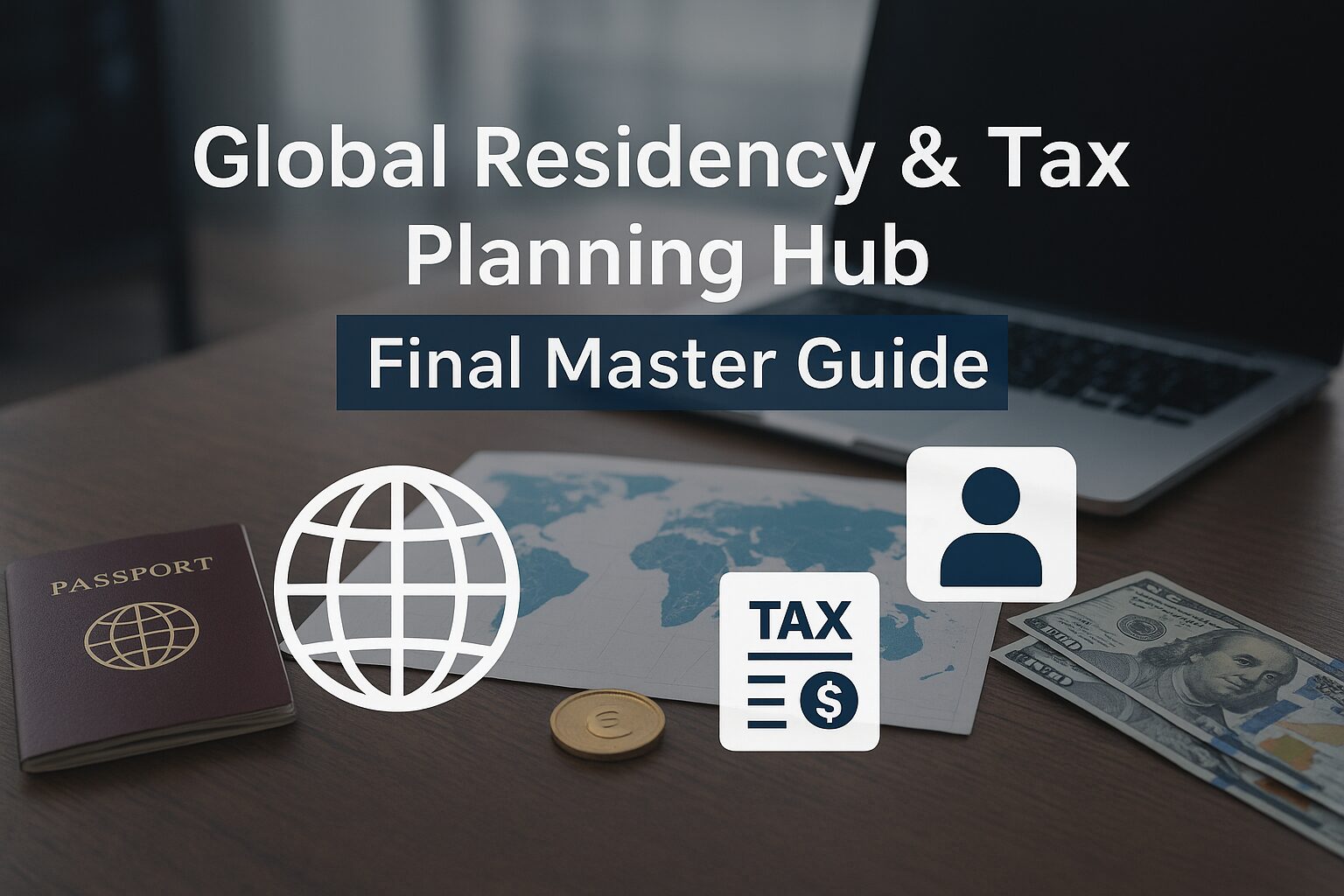Why Global Tax & Residency Planning Matters
In today’s world, wealth no longer has borders. A successful entrepreneur in Silicon Valley can open a company in Singapore, hold assets in Switzerland, and live part of the year in Dubai. But with global opportunity comes complexity: double taxation risks, ever-changing residency rules, and the challenge of protecting both wealth and mobility.
This guide brings together everything we have covered so far — from tax havens to second passports, from digital nomad visas to corporate structures — into a single, actionable roadmap. The goal is simple: help you design a life and business structure that minimizes taxes, maximizes freedom, and ensures long-term security.
Step 1: Choosing the Right Tax Haven – Beyond Just Low Rates
When people hear “tax haven,” they think of zero-income-tax countries. But the truth is more nuanced.
- For Individuals: The UAE (Dubai), Monaco, and the Bahamas remain attractive. They combine tax-free personal income with stable residency options. But lifestyle, infrastructure, and global accessibility also matter.
- For Corporations: Ireland, Singapore, and Estonia provide not only favorable tax regimes but also strong reputations, skilled workforces, and digital infrastructure.
Practical Tip: Don’t just look at the tax rate. Consider the banking system, legal stability, cost of living, and how easily you can maintain residency there. For example, Dubai offers tax-free living, but you’ll need to set up a company and maintain physical presence.
Step 2: Residency by Investment vs. Second Passport – Which Path Fits You?
There are two main strategies for global mobility:
- Residency by Investment (RBI): You invest in real estate, government bonds, or businesses in exchange for residency rights. Examples include Portugal’s Golden Visa or Greece’s Residency Program.
- Best for those wanting EU access without giving up their current citizenship.
- Practical for entrepreneurs who want lifestyle flexibility and Schengen mobility.
- Second Passport (Citizenship by Investment): You obtain full citizenship (and a new passport) by investing in a country’s economy. The Caribbean nations (St. Kitts & Nevis, Dominica) and Malta are popular.
- Best for high-net-worth individuals who need stronger travel freedom or a backup plan.
- Provides inheritance and tax benefits, not just travel mobility.
Decision Framework:
- If you want lifestyle flexibility → Residency by Investment.
- If you want ultimate backup and global identity → Second Passport.
Step 3: Mastering Double Taxation Treaties
Nothing drains wealth faster than paying taxes twice — once in your home country and again abroad. Double Taxation Avoidance Treaties (DTAs) are the legal solution.
- Example: A U.S. investor living in Portugal can use the U.S.-Portugal treaty to avoid being taxed twice on dividends or royalties.
- Corporate Use Case: Many multinationals structure cross-border income streams (royalties, consulting fees) to flow through treaty-friendly jurisdictions like Ireland or Luxembourg.
Practical Tip: Always consult a tax advisor in both countries before moving assets or residency. Treaties are powerful but vary widely.
Step 4: Digital Nomad & Remote Work Strategies
For freelancers, consultants, and remote founders, tax planning looks different.
- Digital Nomad Visas: Estonia’s e-Residency, Portugal’s digital nomad visa, and Costa Rica’s rentista visa allow you to legally live and work abroad.
- Tax Residency Rules: Most countries consider you tax-resident if you stay more than 183 days. But some (like Spain) have stricter criteria.
- Practical Setup: Many nomads establish a base in a low-tax country (like Dubai) while traveling. This avoids falling into accidental tax residency in high-tax jurisdictions.
Checklist for Nomads:
- Keep track of days in each country.
- Maintain a legal residence in one tax-friendly jurisdiction.
- Use international health insurance and multi-currency accounts.
Step 5: Corporate Structures – Where to Incorporate
The right jurisdiction for your business can be worth millions in tax savings.
- U.S. Delaware LLC: Great for startups seeking investors, but pass-through taxation can be risky if you live abroad.
- Singapore Pte Ltd: Excellent for tech and global trading companies, with strong IP protections.
- Estonia e-Residency Company: Perfect for digital entrepreneurs with no physical office.
- UAE Free Zone Companies: Zero corporate and personal income tax, easy repatriation of profits.
Pro Tip: Don’t chase the lowest tax rate. Chase the balance of reputation, ease of banking, investor confidence, and compliance.
Step 6: The Final Roadmap – Building Your Global Strategy
Now it’s time to bring it all together. Here’s the practical step-by-step roadmap:
- Evaluate Your Priorities:
- Lower personal taxes? Global mobility? Corporate expansion? Asset protection?
- Select a Base Country:
- Example: Dubai for tax-free living, Portugal for EU lifestyle, or Singapore for business expansion.
- Secure Residency or Citizenship:
- Decide between RBI and second passport.
- Leverage Double Taxation Treaties:
- Structure investments through treaty-friendly jurisdictions.
- Incorporate Smartly:
- Match your business type with the jurisdiction that offers both tax savings and credibility.
- Maintain Compliance:
- File required reports, keep bank accounts clean, and stay updated with tax law changes.
This is not just about saving taxes — it’s about creating a borderless lifestyle with financial security and freedom of movement.
Conclusion: Your One-Stop Hub for Global Freedom
This master guide closes the loop on our series. You now hold the keys to designing a life where your taxes, residency, and business structures work together seamlessly. The wealthy don’t just earn more — they plan smarter. By applying these strategies, you can join the ranks of global citizens who live where they want, pay less tax legally, and protect their wealth for generations.
📌 Next Article Preview
In our next series, we shift gears from global tax to wealth growth strategies that the ultra-rich don’t want you to know.
👉 Coming soon: “The Offshore Banking Advantage – Why Global Investors Diversify Their Cash Holdings”.
We’ll reveal how offshore accounts provide not just tax benefits, but also currency diversification, access to exclusive investments, and protection against political instability. If you’ve ever wondered how billionaires safeguard their fortunes, this will be your insider roadmap.
